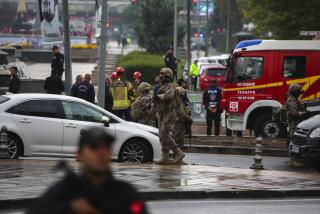16 killed in suicide attack in northern Iraq
- Share via
BAGHDAD — A suicide bomber killed 16 people and injured 12 others Thursday at a crowded restaurant in Khanaqin, a hotly disputed city bordering the Kurdish-controlled region of Iraq.
The attack at the Abu Dilshad restaurant occurred just after 2 p.m., as Iraqi officials prepared to release preliminary results of Saturday’s provincial elections.
“I was sitting at the back of the restaurant having my lunch when a very huge explosion took place,” said Majid Hussein, 25. “I felt everything around me smashing and the pressure of the explosion pushed me through the window.”
Tensions are high in Khanaqin between Arabs and Kurds, who control a semiautonomous area in northeastern Iraq known as Kurdistan.
Although Khanaqin is part of Diyala province, the Kurdistan government wants to include the oil-rich city in the planned referendum on whether to incorporate Kirkuk and other disputed areas into its region.
Last summer, Iraqi security forces and Kurdish troops nearly clashed over Khanaqin after Prime Minister Nouri Maliki sent soldiers there to remove fighters from Kurdistan who had secured the predominantly Kurdish city for years.
Local media reported that most of the victims in Thursday’s bombing were Kurds, and added that the bomber was a woman, a statement U.S. and Iraqi authorities could not immediately confirm.
Salahuddin Karkha, an official with the local Kurdish party, asserted that the attack was carried out in anger over the good showing by Kurdish candidates in the area in the provincial elections. If so, the blast would mark the highest death toll from violence tied to the balloting.
“Some civilians in Khanaqin were celebrating and expressing their happiness for the success in the provincial elections, but the hands of terrorists killed them,” Karkha said.
Much of the tension is the result of a policy of “Arabization” that was begun by former President Saddam Hussein, who encouraged Arabs to settle in fertile and resource-rich areas that were populated by Kurds.
Sunni Arab insurgents have vowed to hold on to those seized lands and oppose Kurdish expansion. The issue has proved to be one of the most difficult facing post-Hussein Iraq.
“The Arab-Kurd tensions have not really been addressed yet. It’s a huge political issue that the parties must come together on,” said Army Brig. Gen. Daniel B. Allyn, one of the top U.S. military strategists in Iraq. “There’s huge historical tension there that we’re going to have to help the government of Iraq work through.”
Asked recently what his biggest worry was for the future of Iraq, U.N. Special Representative for Iraq Staffan de Mistura said: “If I had to choose which one keeps me awake at night, it is the disputed areas, because tension between Arabs and Kurds is an area which we need to defuse for the future.”
--
tina.susman@latimes.com
More to Read
Sign up for Essential California
The most important California stories and recommendations in your inbox every morning.
You may occasionally receive promotional content from the Los Angeles Times.












